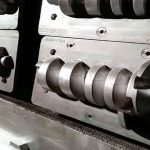The mold industry is a derivative manufacturing industry that serves the manufacturing industry. To put it bluntly, a mold is a model, a mold used to mass-produce products for manufacturers. Manufacturers need to quickly produce products according to this ready-made model. Molds have played an irreplaceable role in our lives. Most of our daily necessities are inseparable from molds, such as computers, telephones, fax machines, keyboards, cups, chairs, spoons and other plastic products. In addition, like automobiles, the outer covers of motorcycle engines are also made of molds. It takes more than 20,000 molds for a car bumper, car lights, grille, plastic parts, interior parts, etc. Modern life is inseparable from the support of the mold industry. As long as it is a product that needs to be mass-produced, it cannot be separated from the mold, at least in the last 50 years. How the mold is produced may not be very clear to most people except those in the mold industry.
Punching die standard: die base (GB/T2851-2861); steel die base (JB/T7181-7188); parts and technical conditions (JB/T7642-7652); round punch and round die (JB/T5825-5830)
Plastic injection mold standards: parts (GB4169-4170); medium and small mold bases and technical conditions (GB/T12556.1-2); large mold bases and technical conditions (GB/T12555.1-15)
Die-casting mold standard: die-casting mold parts and technical conditions (GB4678-4679)
Forging die standard: general forging module size series and measurement method (JB/T5900); diamond wire drawing die (JB3944-85)
Technical conditions for die acceptance (GB/T14662-93); technical conditions for die steel and heat treatment (JB/T6058-92); technical conditions for die holders (JB/T8050-95); accuracy inspection of die holders (JB/T8071) -95).
Technical requirements for acceptance of plastic injection molds (GB/T12554-90); technical requirements for plastic packaging molds (GB/T14663-93); specification of dimensional tolerances for plastic packaging molds (GB/T14664-93); technical conditions for steel used for plastic mold forming part and its heat treatment (JB/T6057-92); Surface type and roughness of plastic molding die (JB/T7781-95)
Technical conditions for acceptance of die-casting mold (GB8844-88)
General technical conditions for roll forging dies (ZB/TJ46003-90); technical conditions for cold forging dies for fasteners (JB/T4213-96); technical conditions for steel and heat treatment for cold forging dies (JB/T7715-95); hot forging forming Technical conditions for die steel and its heat treatment (JB/T5823-91); technical conditions for polycrystalline diamond wire drawing die (JB/T5823-91); technical conditions for hard alloy wire drawing die (JB/T3943-85).
Mold Wiki provides you with the most comprehensive plastic, plastic, mold, mold design, decoration knowledge points of plastic mold brands, and shopping guide and online shopping services for various plastic molds, with the cheapest plastic mold prices and the best quality after-sales service. Please visit Mold Wiki: https://mold.wiki/Keywords of the article: plastic; related plastic products:
Link to this article:Analysis of technical industry standards for various molds
Reprint Statement: If there are no special instructions, all articles on this site are original. Please indicate the source for reprinting:Mold Wiki,Thanks!^^

